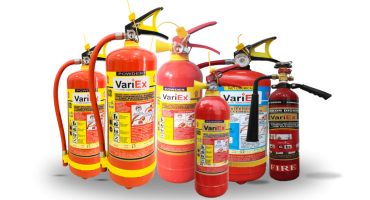![]()
Fire Immuniser
+91-7829629111
Email: info@variex.in
Varistor Technologies Pvt. Ltd.
Block-1, First Floor, Ardente Office One, Hoodi Circle, ITPL Main Road, Bengaluru, Karnataka 560048, IN
Types of Fire Extinguishers: A Guide
Fire extinguishers are essential tools for quickly and effectively extinguishing fires. They can help to prevent a small fire from turning into a devastating blaze. However, not all fires are the same, and it's important to have the right "Types of Fire Extinguishers" for the type of fire you're dealing with. In this blog post, we'll cover the different types of fire extinguishers available, and what types of fires they're best suited for.
Class A Fire Extinguishers
Class A fire extinguishers are designed to extinguish fires caused by ordinary combustibles such as wood, paper, or cloth. These are the most common types of fires, and class A fire extinguishers are found in most homes and businesses. They are typically filled with water or a dry chemical that can break the chemical reaction that sustains the fire.
Class B Fire Extinguishers
Class B fire extinguishers are designed to extinguish fires caused by flammable liquids such as gasoline, oil, or grease. These types of fires can be very dangerous, as they can spread quickly and cause significant damage. Class B fire extinguishers are typically filled with dry chemicals that are effective in smothering the fire.
Class C Fire Extinguishers
Class C fire extinguishers are designed to extinguish fires caused by electrical equipment such as appliances, computers, or wiring. Water or other conductive materials should never be used to put out electrical fires, as they can cause electrocution. Instead, class C fire extinguishers use non-conductive agents that can safely extinguish the fire.
Class D Fire Extinguishers
Class D fire extinguishers are designed to extinguish fires caused by flammable metals such as magnesium, sodium, or potassium. These types of fires can be particularly difficult to put out, and should only be tackled by trained professionals. Class D fire extinguishers use dry powder agents that can smother the fire by cutting off the supply of oxygen.
Class K Fire Extinguishers
Class K fire extinguishers are designed to extinguish fires caused by cooking oils and fats. These types of fires are very common in commercial kitchens, and can quickly get out of control if not addressed properly. Class K fire extinguishers use wet chemical agents that can effectively put out the fire by cooling the oil and smothering the flames.
In conclusion, having the right type of fire extinguisher can make all the difference in an emergency situation. By understanding the different types of fires and the types of fire extinguishers available, you can make sure that you have the right tools to put out a fire quickly and effectively. Be sure to inspect your fire extinguishers regularly, and replace them as needed to ensure that they're always in good working condition. Remember, a fire extinguisher can save lives and property, so make sure you have the right ones for your needs.
Final Say
We at VariEx.in or Variexonline.com have mastered the art of designing, installing, inspecting, and fixing automatic sprinkler systems with the help of our in-house team, which is capable of delivering the fire sprinkler services you need, whether large or small and at affordable cost.
To schedule a fire sprinkler installation, or you think our services could benefit your commercial property, contact us online or give us a call at, 7829629111










Thanks for sharing the information about types of fire extinguishers.
Thanks for posting such beautiful blog in lucid writing.
In order to fully grasp the many varieties of fire extinguishers, it is recommended that you read this blog post. Insights into the different types of extinguishers, their uses, and how to choose the correct one depending on the kind of fire can be expected from readers. If you or your company are looking to improve your fire safety knowledge, this post could be a great resource.